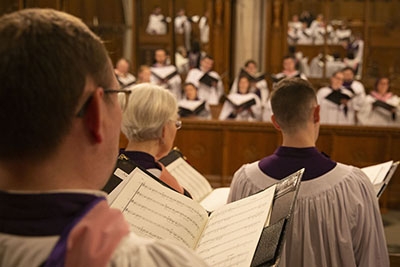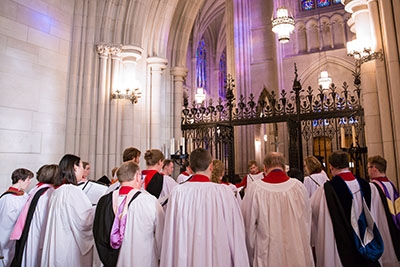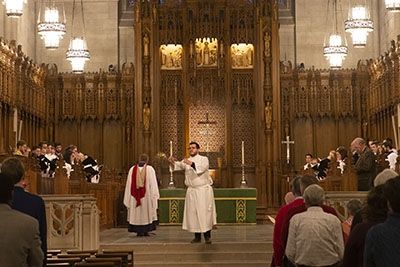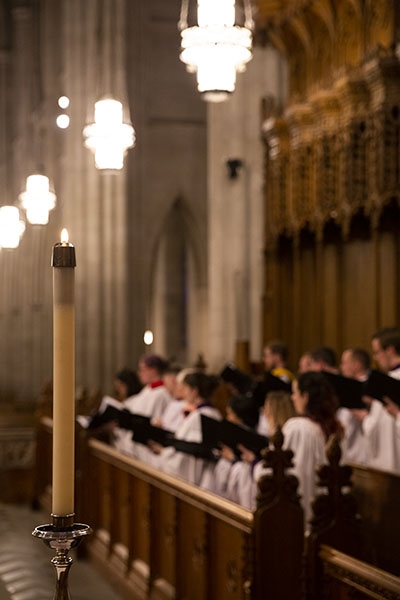
Choral Evensong
Choral Evensong is a centuries-old tradition that continues to be prayed every day all over the world. Drawn from the seventeenth century, worshipers are invited to enter into a sacred space of reflection through music, scripture, and prayers that have shaped Christian lives for hundreds of years.
Time and Location
Choral Evensong is held on Sundays at 4:00 p.m. during the academic year in the Chapel's main sanctuary. People attending the service are invited to sit in the first set of choir stalls in the chancel area where the altar is located. Find information about parking. Before coming to a service, please confirm the time and location on the Chapel's calendar.Ministers and Musicians
Choral Evensong is led by Chapel staff ministers, as well as ministers from some Duke Religious Life groups and local churches. The Duke Evensong Singers, directed by Chapel Organist Christopher Jacobson, FRCO, lead the service's music. (Connect with the Evensong Singers on their Facebook group.) Accompanying the choir, and also playing opening and closing voluntaries for the service, are Chapel Organ Scholars, who spend two years at the Chapel training in sacred music.
Webcasts and Recordings
Watch Choral Evensong services live online on the Duke Chapel YouTube channel, as well as on TV on channel 12 of the Duke Hospital TV System and channel 110 on the Duke Campus Vision TV system. Watch recordings of Evensong services below or visit the full archives.
About the Service
Whether you are accustomed or not to Choral Evensong, we welcome you without reservation or expectation. Feel free to find a quiet corner of the chapel in which to be alone in prayer or, if you prefer, sit amongst the choir in the stalls. The music is sung by the choir offering praise to God on behalf of those gathered here and around the world; the people join silently in prayer alongside them and in speaking together the Confession, the Lord’s Prayer, the Creed, and in singing the Hymns.Rooted in the prayer and wisdom of ancient monastic life, Choral Evensong today embodies Duke University’s motto, Eruditio et Religio, joining faith with learning. Through this liturgy, we enter a realm beyond ordinary experience, surpassing known thoughts and understandings. In Duke Chapel—an outward and visible symbol in stone and glass of the infinitude of God’s steadfast love—our purpose is to render in music, motions and speech, glimpses of God’s beauty and to open to all who come here the way of grace and peace.
The service derives from the medieval church and is offered here in classical form from the 1662 Book of Common Prayer of the Church of England, which sought to harmonize Catholic and Protestant traditions. It is deeply rooted in ancient texts, mirroring the worship of the Twelve Apostles and, before them, of Israel exiled in Babylon “singing the Lord’s song in a strange land” (Psalm 137:4). It is a form of worship offered by Jesus himself in the Temple in Jerusalem and in the Upper Room following the Last Supper.The liturgy follows a set pattern. Following the Opening Sentences, Confession, Absolution, and Lord’s Prayer, the Choir sings the Preces (short petitions) and the Psalms appointed for this day in the evening. The Psalms are precious to us because they formed Our Lord’s Hymnbook, whose power and beauty cannot be surpassed. He prayed and sang these words regularly in the Temple. They embrace the range of human emotion: not only praise, love, joy, and hope but also fear, anger, penitence, and despair. It was from the cross that Our Lord prayed the words of Psalms 22 and 31: “My God, my God, why hast thou forsaken me,” and then: “Into thy hands I commend my spirit.” The Passion narratives make frequent use of the Psalms. By singing and hearing them sung, we directly share the prayers that Jesus prayed, and join with Christians throughout history who have made this their form of praise and worship.
Evensong brings before us God’s plan of salvation. Following the Psalms, the Old Testament lesson recalls God’s promise to Abraham and looks forward to the coming of a messiah. The Magnificat links the Old and New Testaments. It is the splendid song of the Blessed Virgin Mary before Jesus was born and has become the Church’s greatest hymn of the Incarnation, by which God came to earth to save us. Every time we hear the Magnificat we are bowed low before the great miracle: how God gave His Son to became one of us. Following the New Testament lesson, from which we learn about Jesus’s life and teaching here on earth, the Choir sings the Nunc dimittis, the prayer of Simeon, an aged man who longed to see the Christ before he died. Beholding Jesus presented in the Temple, he rejoiced: “Lord, now lettest Thou Thy servant depart in peace.”All then stand and, facing the altar used at the Holy Eucharist, address God in the words of the Apostles’ Creed. This credo summarizes the faith of all those who, generation after generation in the Church, respond to the Gospel of Jesus Christ: He died for us so that we might live in Him.
The Officiant and the Choir then sing The Lesser Litany and the Collects: set prayers that with simplicity collect our thoughts, bidding God to strengthen our faith and protect us from all perils as evening falls. The Anthem follows, meditating on Biblical and Prayer Book texts and providing a sermon in music.
Distinct from the noisy world around us, Choral Evensong anchors us in the Presence of the Living Christ. It thickens our imagination for mysteries yet undisclosed and realities yet unknown. We hope that the prayers of this Evensong, offered amidst the beauty of Duke Chapel, might help you to come closer to Our Lord who both commands us to pray and promises to hear us.



